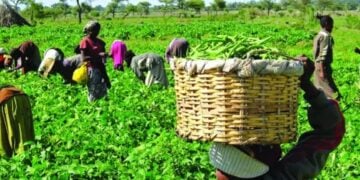The FCT Special Agro-Industrial Processing Zones (SAPZ) Project has conducted a sensitisation exercise to educate prospective beneficiaries on the importance of climate-smart agricultural practices.
The coordinator, SAPZ, Dr. Omole Olateju, disclosed this during a sensitisation program at Paikon-Kore, Gwagwalada Area Council, Abuja, emphasising that understanding climate dynamics is crucial for agricultural productivity globally.
According to him, the program aims to equip farmers with knowledge and skills to mitigate the adverse effects of climate change on agricultural productivity.
“Farmers are being encouraged to adopt new practices that match current production demands, moving away from traditional methods that may no longer be effective”.
He said the program targets 400 participants, with 200 attending sessions at each of the two project sites, Paikon Kore and Karshi grazing reserves.
Dr Omole further stressed that farmers must find ways to adapt to these changes to improve their productivity. At the same time, it encourages the beneficiaries, comprising farmers and pastoralists, to take the information shared seriously and apply it to their production practices.
He emphasised the importance of asking questions and seeking clarification on any unclear points, assuring participants that their queries would be addressed.
The FCT—SAPZ Environmental and Social Safeguard through Climate Change Officer, Mr Larayetan Shedrach Olabode, said the SAPZ Project in the Federal Capital Territory (FCT) initiated a sensitisation program for farmers on climate change-related risks, mitigation measures, and adaptation strategies.
The aim is to equip farmers with the knowledge and skills necessary to manage the impacts of climate change on their crops and livestock.
Mr. Olabode emphasised that climate change refers to long-term temperature and weather pattern shifts caused by human activities and natural events.
He noted that the SAPZ Project will significantly impact infrastructure, crops, and livestock and that sensitising farmers ahead of the Project’s implementation activities is crucial to ensuring their ability to manage climate-related shocks.
The sensitisation program, which is expected to cover over 200 beneficiaries each in Paikon-Kore and Karshi grazing reserves, will focus on climate change mitigation and adaptation measures, including proper livestock management and recycling practices to reduce environmental pollution. Mr. Olabode stressed that the sensitisation would be an ongoing process, continuing even after the Project is completed.
He added that some beneficiaries may be selected for further capacity training on climate change, focusing on building resilience, adaptation, and mitigation strategies.
Climate change expert and environmentalist Mr B.J. Bamisaiye said that climate change and farmers must adjust their production approaches to mitigate its adverse effects.
The environmentalist emphasised the importance of equipping farmers with the correct information to ensure climate resilience in their production activities.
One of the participants, Abubakar Mohammed Juli, expressed gratitude to the program organisers and the resource person for sharing their expertise and experience.
He said the training would empower farmers to improve their productivity and resilience to climate change.





